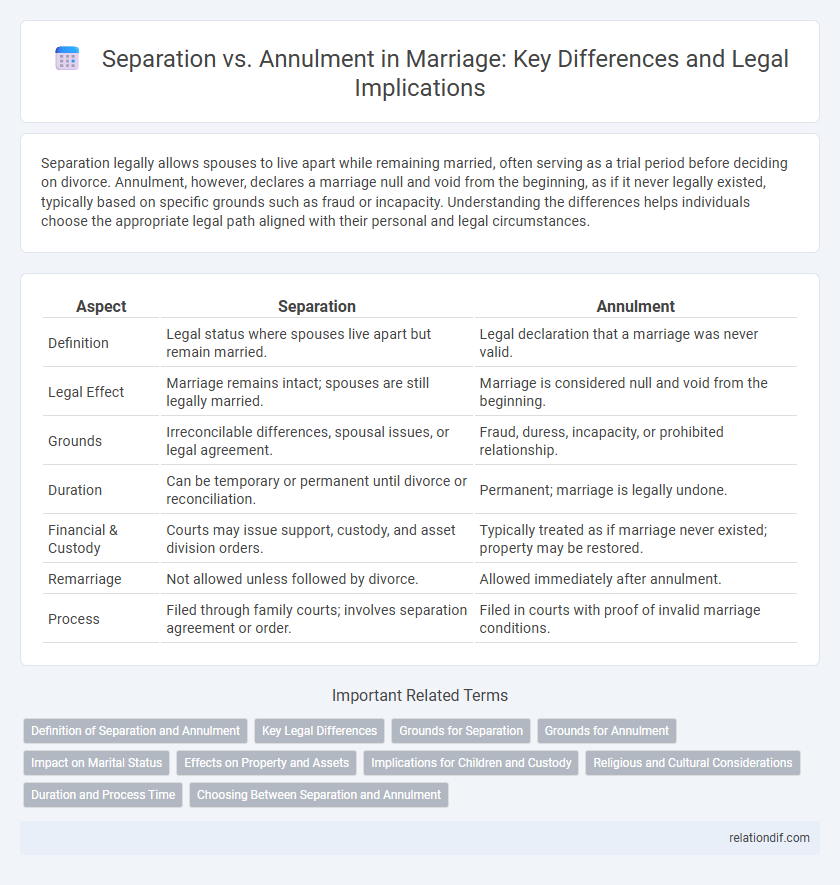Separation legally allows spouses to live apart while remaining married, often serving as a trial period before deciding on divorce. Annulment, however, declares a marriage null and void from the beginning, as if it never legally existed, typically based on specific grounds such as fraud or incapacity. Understanding the differences helps individuals choose the appropriate legal path aligned with their personal and legal circumstances.
Table of Comparison
| Aspect | Separation | Annulment |
|---|---|---|
| Definition | Legal status where spouses live apart but remain married. | Legal declaration that a marriage was never valid. |
| Legal Effect | Marriage remains intact; spouses are still legally married. | Marriage is considered null and void from the beginning. |
| Grounds | Irreconcilable differences, spousal issues, or legal agreement. | Fraud, duress, incapacity, or prohibited relationship. |
| Duration | Can be temporary or permanent until divorce or reconciliation. | Permanent; marriage is legally undone. |
| Financial & Custody | Courts may issue support, custody, and asset division orders. | Typically treated as if marriage never existed; property may be restored. |
| Remarriage | Not allowed unless followed by divorce. | Allowed immediately after annulment. |
| Process | Filed through family courts; involves separation agreement or order. | Filed in courts with proof of invalid marriage conditions. |
Definition of Separation and Annulment
Separation is a legal process where a married couple lives apart while remaining legally married, often used as a step before divorce. Annulment, however, declares a marriage null and void as if it never legally existed, based on factors like fraud, coercion, or incapacity. Understanding the distinction is crucial for addressing marital status and legal rights after the relationship ends.
Key Legal Differences
Separation legally recognizes a couple's decision to live apart while remaining married, often involving court orders addressing child custody, support, and property division without ending the marriage itself. Annulment, by contrast, declares the marriage null and void, as if it never legally existed, based on grounds such as fraud, coercion, or incapacity at the time of marriage. Key legal differences include the continuation of marital status during separation and the retroactive dissolution of marriage through annulment.
Grounds for Separation
Grounds for separation typically include irreconcilable differences, desertion, cruelty, and adultery, serving as legal reasons for spouses to live apart without dissolving the marriage. Separation allows couples to address issues while remaining legally married, often as a precursor to divorce or reconciliation. Courts require clear evidence of these grounds to grant separation, ensuring protection of rights and obligations during the process.
Grounds for Annulment
Grounds for annulment include fraud, concealment, incapacity, and coercion, which render a marriage legally invalid from its inception. Separation, by contrast, acknowledges a valid marriage but allows spouses to live apart without dissolving the marital status. Annulment requires proving specific legal criteria that demonstrate the marriage never met the essential conditions for validity.
Impact on Marital Status
Separation legally allows spouses to live apart while remaining married, preserving the marital status but altering living arrangements and responsibilities. Annulment declares the marriage null from the beginning, effectively erasing the legal existence of the marriage and restoring both parties to single status. The impact on marital status distinguishes separation as a temporary change versus annulment as a permanent dissolution of the marital bond.
Effects on Property and Assets
Separation typically allows spouses to divide property and assets through a formal agreement or court order, often maintaining ownership rights as they existed during the marriage. Annulment, declaring the marriage void from the beginning, generally treats assets as if the marriage never occurred, which can nullify claims based on marital ownership. Property acquired individually before the marriage or after annulment proceedings might remain unaffected, but jointly held assets often undergo complex legal reassessment.
Implications for Children and Custody
Separation allows legal recognition of spouses living apart while maintaining the marriage, impacting child custody arrangements with courts prioritizing the child's best interests. Annulment declares the marriage void, often complicating custody due to the marriage being considered never legally valid, but courts still ensure child welfare is paramount. Both processes require detailed legal evaluation of parental rights, visitation, and support to protect children's stability and well-being.
Religious and Cultural Considerations
Separation often allows couples to maintain religious recognition of marriage, whereas annulment declares the marriage null from the start, affecting religious status and cultural acceptance differently. Many religious traditions, such as Catholicism, strictly permit annulment only under specific conditions, influencing community and familial relationships. Cultural norms may view annulment as erasing the marriage bond, while separation can be seen as a temporary or reversible state within the marital framework.
Duration and Process Time
Separation typically requires a court-approved waiting period that can last from six months to several years, depending on jurisdiction, while annulment is generally processed more quickly, often within a few months, because it declares the marriage void from the start. The separation process involves establishing legal terms for living apart, custody, and division of assets, which can extend the timeline. Annulment requires proving conditions existed at the time of marriage that invalidate it, leading to a usually shorter and more straightforward legal procedure.
Choosing Between Separation and Annulment
Choosing between separation and annulment requires understanding their legal and emotional implications. Separation allows couples to live apart while remaining legally married, often addressing financial and custodial arrangements, whereas annulment declares the marriage null from the start, as if it never existed, based on specific grounds like fraud or incapacity. Couples must evaluate their circumstances, consulting legal professionals to determine which option aligns best with their rights, responsibilities, and future plans.
separation vs annulment Infographic

 relationdif.com
relationdif.com